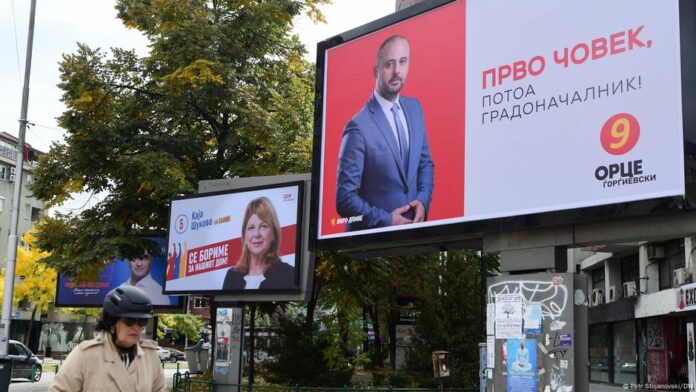Voters across North Macedonia will head to the polls Sunday for local elections seen as a key test of the ruling government’s strength — and of the country’s patience with a prolonged blockade on its path to European Union (EU) membership.
Although the elections are meant to focus on municipal issues, the campaign has been dominated by national questions: identity, minority rights, and the stalled EU accession process.
In the capital, Skopje, pressing local challenges remain unresolved. The city of about 520,000 people still lacks a wastewater treatment plant and has no public transport alternatives to buses. The next mayor will also need to adopt a long-delayed “General Urban Plan for 2022–2032” and oversee preparations for “Skopje – European Capital of Culture 2028.”
“Despite being local elections, the campaign has been driven by national questions — identity, minority rights and what it takes to unblock EU accession,” Dimitar Nikolovski, executive director of the Eurothink – Center for European Strategies, told DW.
EU accession stalemate prominent
Political rivals have spent much of the campaign trading blame over who is responsible for the deadlock in North Macedonia’s EU membership negotiations.
The country became an EU candidate in December 2005, but nearly two decades later it remains stuck at the start of the process — blocked by Bulgaria and having held only the first intergovernmental conference, which opens accession negotiations.
Venko Filipce, leader of the opposition Social Democratic Union of Macedonia (SDSM), opened the campaign by proposing a resolution to define state positions on the country’s EU path. He urged the government to meet obligations under the framework for EU membership negotiations by February 10, 2026.
“If we achieve national consensus and work intensely on reforms, no one and nothing will be able to stop us on the way to the EU,” Filipce said.
He also said he’d vote to include the Bulgarian ethnic minority in the Macedonian constitution, alongside other ethnic communities — a step expected to prompt Bulgaria to lift its veto, imposed in November 2020, on the start of membership talks.
This proposal poses a challenge for Prime Minister Hristijan Mickoski, leader of the ruling VMRO-DPMNE (Internal Macedonian Revolutionary Organization – Democratic Party for Macedonian National Unity) party, who rejected it, arguing it fails to protect Macedonian national interests. During pre-election rallies, Mickoski accused the opposition of yielding to Bulgaria’s demands.
“Unless there’s a political compromise that lowers the temperature and provides credible guarantees from the EU in line with our government’s expectations, I would expect continued gridlock rather than a quick breakthrough,” Eurothink’s Nikolovski said. “However, there are signals the government may propose another solution before the end of the year.”
EU reaffirms its stance
Just days before the elections, European Commission President Ursula von der Leyen visited Skopje and met with Mickoski. The government reaffirmed that EU membership remains a strategic goal but stressed it would not compromise national dignity.
“This government has no intention to lose dignity and honor anymore,” Mickoski said ahead of the meeting.
Von der Leyen reiterated that North Macedonia must meet its commitments under the EU framework.
“The next and only step before opening negotiations is clear — you need to make the agreed constitutional change,” she wrote on X after the meeting.
Public Opinion and Polls
Public opinion over the country’s direction remains sharply divided. An October survey conducted by the Institute for Political Research for the Macedonian public broadcaster MRTV showed 28.3% of citizens believe the country is moving in the wrong direction, while 27% say it is on the right path.
Despite the polarization, the ruling VMRO-DPMNE party appears poised to win Sunday’s elections. The poll found 26.7% support for VMRO-DPMNE, compared with 11.1% for SDSM. The Levica (Left) party, which advocates closer ties with Russia and China, had 5.5% support. Independent candidates drew 4.3%, while the smaller government coalition partner ZNAM stood at 3.8%.
In the Albanian community, which comprises around a quarter of the country’s 1.8 million strong population, the opposition National Alliance for Integration (BDI) leads with 9.9%, while the ruling coalition of Albanian parties, VLEN, holds 7.5%.
Albanians hold a special position in North Macedonia. Albanian is the country’s second official language and a certain percentage of jobs in the public sector are allocated to Albanians. Albania’s actions have an effect on the politics in North Macedonia’s Albanian community as well. The start of Tirana’s EU membership talks last year has strengthened BDI’s position, as the neighboring country has already opened five of six negotiating clusters.
BDI leader Ali Ahmeti said the Macedonian government’s frozen EU talks and ties with Serbian President Aleksandar Vucic’s regime are problematic.
“Next spring we must go to early [national] elections, which will be held in the spirit of legitimacy and national pride,” Ahmeti said.
Local elections as a political test
Nikolovski of Eurothink described Sunday’s local elections as a “stress test” for the government’s mandate.
“Given recent frictions among ethnic Albanian partners, outcomes in key Albanian-majority municipalities will be watched for signs of coalition change, with a potential shift of BDI negotiating a position in government,” he said.
He added that the campaign has been highly polarized but noted no signs of foreign interference similar to the Russian-style operations seen in Moldova.
“I feel there has not been such high interest in North Macedonia from Russia,” Nikolovski said.
The State Election Commission confirmed 577 lists of candidates for local councils. Voters will choose councilors on Sunday, with possible runoffs on November 2 for mayoral races.
A total of 309 mayoral candidates are competing across 81 municipalities, but only 32 are women.
Edited by: Keno Verseck
Source link






